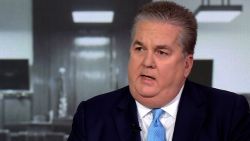Editor’s Note: John Avlon is a CNN senior political analyst. The opinions expressed in this commentary are his own. View more opinion articles on CNN.
Politics is history in the present tense – and that was definitely true at the House impeachment hearings.
There were the usual partisan theatrics, full of sound and fury, signifying nothing.
But the main event was the imposition of legal and historic perspective at a time when that’s the thing we have least of in our politics.
Professor Jonathan Turley was a Republican witness and he also testified in Bill Clinton’s 1998 impeachment. He was careful to make it clear that he did not vote for President Donald Trump. Instead, he framed himself as a devotee of James Madison in a time of “intense rancor and rage.”
But it’s important to understand that Professor Turley was a strenuous advocate for the impeachment of former President Clinton while he now opposes the impeachment of President Trump, saying this:
“I am concerned about lowering impeachment standards … This impeachment would stand out among modern impeachments as the shortest proceeding, with the thinnest evidentiary record and the narrowest grounds ever used to impeach a president.”
Let’s take a step back and look at what Mr. Turley’s favorite founder James Madison said during the constitutional convention about the intent of impeachment.
In his “Notes of Debates in the Federal Convention,” Madison argued that for a chief magistrate “The limitation of the period of his service, was not a sufficient security … He might pervert his administration into a scheme of peculation or oppression. He might betray his trust to foreign powers..”
Got that? Madison is arguing for the necessity of impeachment because elections may not be enough to constrain a chief executive. And the influence of foreign powers in our domestic affairs – as well as corruption and loss of capacity might be “fatal to the Republic.”
George Washington’s farewell address and the Federalist Papers make it clear that foreign interference in our politics was a core concern of the founders. As Alexander Hamilton wrote in Federalist No. 75: ” An ambitious man might make his own aggrandizement, by the aid of a foreign power, the price of his treachery to his constituents.”
Out of the four presidential impeachments proceedings in our history, this is the first that involves foreign powers being asked to interfere in our politics by the president – just as the founders feared.
Andrew Johnson – our 17th president – was a bitter white supremacist, but his impeachment was railroaded by radical Republicans who initially presented their intent to impeach without a sense of what the charges might be.
Former President Richard Nixon was charged with abuse of power, obstruction and contempt of congress for the Watergate break-in, aimed at sabotaging his political rivals.
Bill Clinton was impeached for lying under oath about an affair with an intern – something that there is no evidence that the founders ever had in mind.
Nonetheless, Jonathan Turley argued in 1998 column titled “Why The President Must Be Impeached” that “impeachment serves a purpose beyond removal … the House does not convict but merely accuses. Thus, the House plays an important role in deterring presidential misconduct.”
But that deterrence mechanism now seems unwise to Turley.
In 1998, Turley was concerned about the impact of not impeaching the president, saying, “If you decide that certain acts do not rise to impeachable offenses, you will expand the space for executive conduct.”
It’s reasonable to think that Turley simply changed his mind over time.
But in a 2014 op-ed in the Washington Post, Turley wrote that “While there’s a high bar for what constitutes grounds for impeachment, an offense does not have to be indictable. Serious misconduct or a violation of public trust is enough.”
As a specific example, he cited former President Barack Obama’s transfer of $454 million from the ACA prevention fund, which had a handful of Republicans talking about impeachment.
Turley stated that what Obama did was not in the realm of impeachment – but it would rise to that level if he “redirect[ed] it to another purpose without congressional approval and offer a faulty interpretation of the act. If the president were to openly defy clear federal authority and order unlawful acts, he would move from the realm of using arguable discretion to that of being a danger to the system as a whole.”
A reasonable person might argue that’s what President Trump seems to have done by withholding congressionally appropriated military aid to Ukraine unless it announced an investigation into his political rivals. (Trump has denied any quid pro quo.)
Five years ago, Turley wrote: “there is a real crisis in how our system is changing with the rise of the uber-presidency.”
Get our free weekly newsletter
Today, he seems far more concerned about congressional overreach and the impact of impeachment on our polarized politics.
Look, no one should be an impeachment enthusiast. But partisan politics shouldn’t change your underlying principles on the issue … as we have seen from so many Republicans in their statements between the Clinton impeachment and today.
As Professor Turley said back then: “The only thing you can’t grant in a Madisonian democracy is an exception…it’s not a pretty process, but it survives.”























